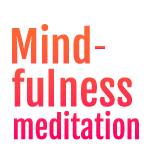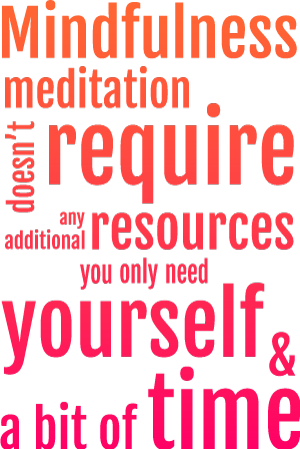Four ways to work mindfulness into a daily routine

Anxiety and stress are common emotional reactions experienced every day but they can become detrimental to a person’s health if they are not dealt with before they become too overwhelming. Mindfulness is a meditation technique that can help manage anxiety and stress. Research has found that practicing mindfulness produces beneficial effects for psychological and physical functioning (1), and so is often incorporated as a vital component of various psychological interventions, like Cognitive Behavioural Therapy (CBT) and Mindfulness-Based Stress Reduction (MBSR).
Mindfulness is the state of being present and aware when experiencing your surroundings. It involves keeping a level-headed and non-judgemental perspective whilst processing your thoughts, emotions, and sensations of the things around you. Mindfulness is said to be an inherent human ability but it requires practice to be able to utilise it as a form of meditation.

Mindfulness meditation doesn’t require any additional resources; you only need yourself and a bit of time. Next time you’re feeling overwhelmed and you’re struggling to focus, here are a few mindfulness techniques you can use:
- Focus on how you are walking, on how your body feels relative to the ground. Remember to stay in the present and let any lingering thoughts go. As you breathe, be aware of how the wind brushes against you while you walk. Notice the sights and sounds of your surroundings, like the cars and other pedestrians going past or how the sky appears.
- Lying down before bed. Pay attention to your body relative to the bed. Notice how the blanket covers you, how your clothes feel on you. Focus on how your breath goes in and out of your nose.
- Next time you have a meal, imagine as if it is the first time you are having this meal. Take in the flavour combinations, texture, smells, and appearance of the food. Focus on the muscles used to move your mouth while you chew.
- Brushing your teeth. Focus on getting to all corners of your mouth. Feel the bristles brushing against your gums and teeth. Notice the sounds you make as you brush, how fast and slow your brush strokes are at each angle.
These are all examples of being mindful of what’s around you. It allows your mind to focus on the present, so that other stressors and thoughts can’t intrude on your mind. By focusing on the task at hand, the build-up of anxiety or stress cannot overwhelm you as you are not giving any focused attention to them. There will be wandering thoughts unrelated to the task that will come by. It is important that you acknowledge that they are there, but to let them pass without too much thought and judgement. It can be quite an effort and exhausting in the beginning to avoid overanalysing everything when you try to be more mindful. It is important to remember to only be aware of such things, and not think about what, why, and how these things have come to be.
Mindfulness is a unique form of meditation. Rather than striving to empty yourself of thoughts or channel your spiritual mind, its aims are to pay attention to the present, or task at hand. It can be more useful compared to other forms of meditation because of its practicality. You can apply mindfulness to a task at work, conversation you are having with a friend, or even when you have some alone time at home.
App:
Smiling Mind – a modern app with creative ways of mindfulness meditation. You can track your progress as you continue your mindfulness journey.
By Johnny Wang
References
- Hölzel, B. K., Lazar, S. W., Gard, T., Schuman-Olivier, Z., Vago, D. R., & Ott, U. (2011). How does mindfulness meditation work? Proposing mechanisms of action from a conceptual and neural perspective. Perspectives on psychological science, 6(6), 537-559.
- https://luria.ucsd.edu/xmca/attachments/1905/mindfulnessmediation.pdf
Newsletter
Stay up to date
Sign up to our Mind Reader newsletter for monthly mental health news, information and updates.
